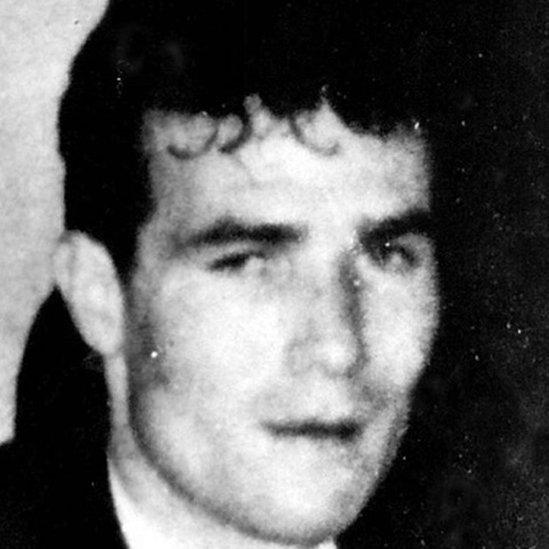Troubles killings: MoD defends Facebook post
- Published

Bernard Watt, 28, was shot by the Army during disturbances in Belfast's Ardoyne area in 1971
The Ministry of Defence (MoD) has defended a Parachute Regiment Facebook appeal asking former soldiers for information about a Troubles killing.
Bernard Watt, 28, was shot by the Army during disturbances in Belfast's Ardoyne area in 1971.
In the post, the Parachute Regiment asked former members with any knowledge of the incident to get in touch.
Hundreds of Facebook users posted angry comments describing the appeal as a "witch hunt against ex-soldiers".
Of the killings being investigated by the PSNI's legacy branch, 530 were carried out by republicans, 271 by loyalists and 354 by the security forces.
It is not known who was responsible for the other 33 killings.
But an MoD spokesperson said it was co-operating with the coroner's process and must make all reasonable attempts to contact those who may have knowledge of a particular incident.
The appeal was posted last week, before a preliminary hearing of the inquest on Friday.
At the hearing, a lawyer for the MoD said a total of 117 former soldiers are being sought and two were "alive and cooperating".
The British Army were responsible for some of the killings carried out in Northern Ireland during the Troubles
The lawyer said that four soldiers had provided statements at the time of Mr Watt's shooting, but that the MoD had not retained names.
He said they were starting again with a blank page, and were still trying to trace nine of those 117 soldiers.
The lawyer added that the tracing process had gathered pace over the last 18 months.
He also said that an article placed in the an MoD regimental magazine in November 2015 asked ex-military personnel to come forward with information on 10 people killed by soliders in Ballymurphy in 1971.
This was then widened to include other legacy cases.
'Not a witch hunt'
The PSNI's legacy branch is re-investigating 1,118 deaths not previously reviewed or completed by the now defunct Historical Enquiries Team (HET).
Solicitor Padraig O'Muirigh who represents the Watt family, said progress on the case, to date, had been "very disappointing".
"This inquest was directed by the Attorney General in 2012, almost five years ago, and to date there has been very little success in identifying soldiers involved on that particular day," he said.
"This family never had a proper investigation and it's not about a witch hunt. An inquest is a fact-finding mission, it doesn't make decisions on criminal or civil liabilities so to call it a witch hunt is a gross exaggeration."
'Fear'
Major General Tim Cross, a retired British Army officer who served in Northern Ireland, said he was not surprised that the MoD had had difficulty in tracking down former soldiers.
"I would be very surprised and amazed if soldiers start ringing up and saying 'yes, I'm happy to come up and give witnesses' because they'll fear that they'll end up in the dock themselves," he said.
"Part of the problem is for good or ill is that a lot of soldiers are angry about the way that people are going back in history and trying to dig up stuff and put them on trial when these guys as young men put their lives on the line defending democracy and serving on behalf of their nation and they feel that the government are just abandoning them."
Unionists and senior Conservative politicians, including the Secretary of State, James Brokenshire, have claimed that investigations into Troubles killings have been unduly focused on killings by the Army.
This was disputed by police figures seen by the BBC.
They showed that investigations into killings by the Army account for about 30% of the PSNI's legacy workload.
- Published2 February 2017
- Published9 December 2016
- Published1 December 2010
- Published12 August 2013